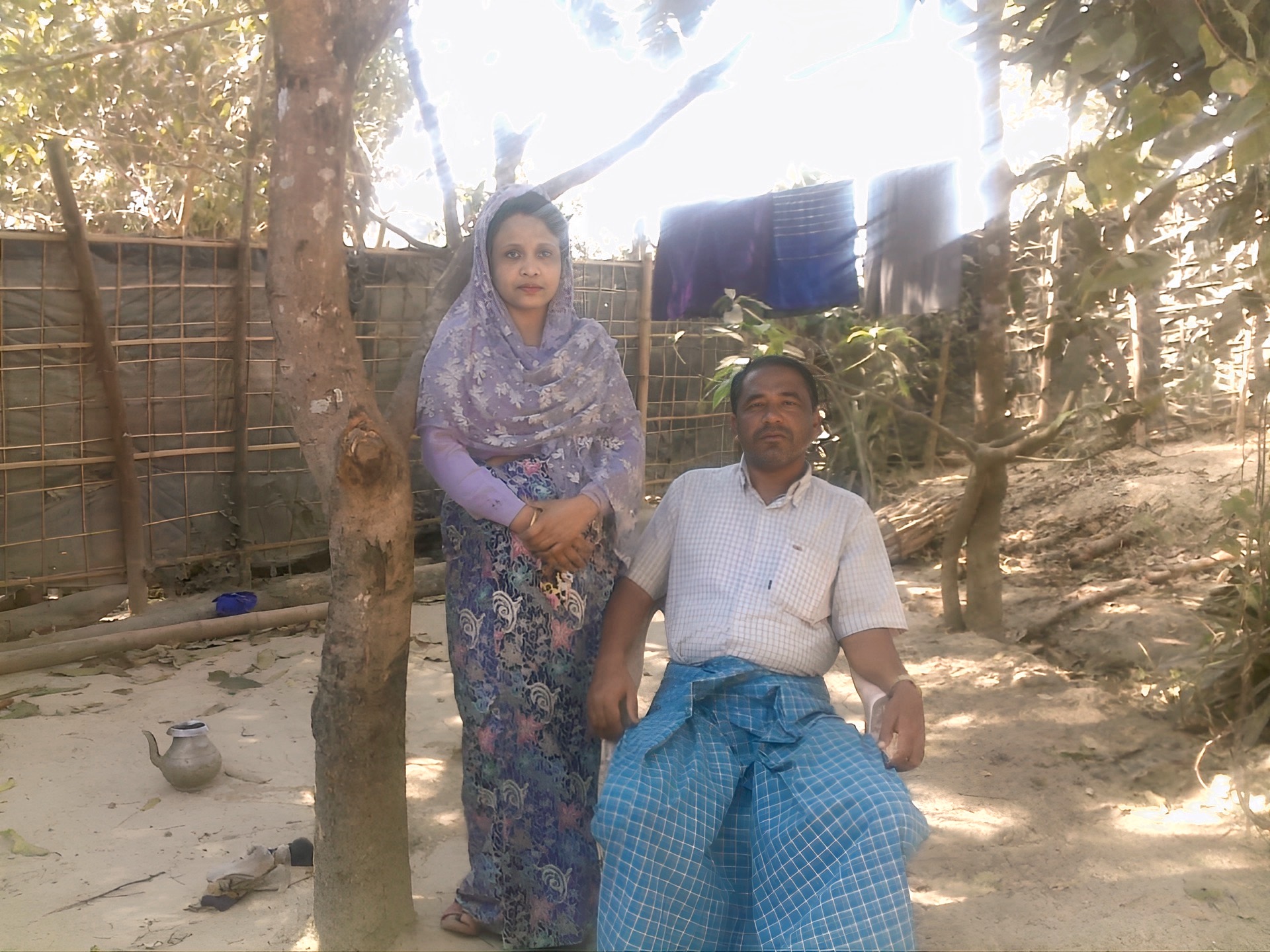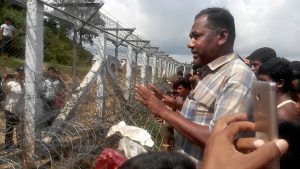A steadfast Rohingya advocate emerged amid the chaos in the volatile borderlands between Myanmar and Bangladesh. Dil Mohammed, a Rohingya refugee who became the de facto spokesperson for the No Man’s Land Rohingya encampment, navigated a complex web of political and military forces to champion the cause of his people. But on January 18, as the encampment burned to the ground in a harrowing attack, Dil Mohammed was apprehended by the long-dormant Rohingya Solidarity Organization (RSO), which had recently re-emerged. No news of his fate has emerged since.
Dil Mohammed’s life was not always marked by strife. Born on January 2, 1966, in Mae Dee Village, Qunthi Bin Village Track, Maungdaw Township, Arakan State, Myanmar, to parents Nazumiya and Hazara Khatun, his early years were filled with education and – despite the difficult context for Rohingya in Myanmar – opportunity. Dil Mohammed matriculated at the University of Yangon in 1987 and graduated with a degree in psychology. He then worked as an interpreter and field manager for the World Food Program for five years, later starting his own shrimp and agricultural businesses.
His linguistic skills caught the attention of officials, and he began working as an interpreter at “flag meetings” between the Myanmar and Bangladesh border guards. In 2014, he played a pivotal role in the high-profile retrieval of a Bangladeshi border guard’s body.
However, his life took a drastic turn in 2017 when he became a refugee for the second time amid a harrowing military crackdown on the Rohingya population. Instead of entering Bangladesh, Dil Mohammed chose to stay in the No Man’s Land (NML) between the two countries.
The NML was a precarious place, where Rohingya refugees like Dil Mohammed found themselves caught between the forces of Myanmar and Bangladesh, facing harassment, flooding, ration reductions, and the infiltration of armed groups. Despite the dangers, Dil Mohammed emerged as a prominent spokesperson for the NML residents, frequently speaking to the press and meeting with international delegations, including U.N. Special Rapporteur Yanghee Lee and Nobel peace laureates Tawakkol Karman and Mairead Maguire.
Dil Mohammed’s second son, Shuiab, described his father as “a kind and easygoing man, both as a parent and as a community leader.” He emphasized that Dil Mohammed was “always approachable and understanding,” but when confronting Myanmar authorities like the Border Guard Police (BGP), Tatmadaw, and NASAKA (Myanmar’s much-maligned former border security force), he was “firm and resolute.” Shuiab added that many Rohingya knew his father never hesitated to stand up to these forces for the rights and dignity of their people.
And there was much to threaten the Rohingya. Dil Mohammed and the NML population found themselves caught in the midst of intense fighting between the Arakan Army (AA), the Myanmar military, and the presence of armed organizations like the Arakan Rohingya Salvation Army (ARSA) in the borderlands, especially in 2022.
The AA’s ambition to establish autonomy has driven their strategy to seize control of Myanmar’s borders with Bangladesh and India. Dominating these border areas would enable the AA to play a crucial role in trade with the neighboring countries and potentially open a new overland arms supply route from areas in Bangladesh where insurgent groups, including ARSA, have long operated.
As a result of these strategic objectives, the borderlands became a battleground, with the AA and the Myanmar military as the dominant forces, while ARSA strived to retain its foothold. According to Myanmar government documents, ARSA engaged in skirmishes with the Myanmar military in 2022 and became a target for both Bangladesh’s and Myanmar’s border forces. This intense fighting led to casualties, injuries, and unexploded ordnance that threatened the safety and stability of the NML population.
Despite being overstretched by conflicts in other regions, the Myanmar military showed no signs of conceding the lost border territories to the AA. Troop movements in the area indicated that the military had not abandoned its efforts to regain control of the border areas. Consequently, the specter of renewed fighting in the region continued to loom over the NML population, forcing them to navigate a dangerous and uncertain existence. This context made Dil Mohammed’s advocacy efforts even more crucial for his community.

Dil Mohammed (seated) and his wife in an undated photo. Provided by special arrangement.
But the very same prominence that made Dil Mohammed a lifeline for his community also put him in the crosshairs of powerful factions. Rumors circulated that he was a member of ARSA, casting a shadow over his reputation. Dil Mohammed’s family and close associates vehemently denied these claims, arguing that while he had to engage with ARSA, he was never a supporter. They also pointed out that if his interactions with ARSA were enough to consider him a member, then he could be seen as working for Bangladesh as well, given his equal contact with their authorities.
In January 2023, the Rohingya Solidarity Organization targeted the NML encampment. The attack left the settlement in ashes, and Dil Mohammed was taken into custody. Since then, his whereabouts and fate have remained a mystery. For more than three months, his family and former residents of No Man’s Land have waited in mournful anticipation for news of the man who once bravely championed the cause of his people.
In an ironic twist, Dil Mohammed’s friendship with Ko Ko Linn, the leader of RSO, put him at risk. The two men had been classmates and maintained a close relationship. Ko Ko Linn had urged Dil Mohammed to leave NML and join him in Bangladesh as recently as 2022, warning him of the dangers in the border zone. However, unbeknownst to Dil Mohammed, it would be Ko Ko Linn’s own forces that would ultimately pose the greatest threat to his safety.
Strangely, diaspora Rohingya organizations have remained reticent about his capture and the devastating attack on the NML camp. Their silence has been particularly conspicuous given the deaths of a Rohingya woman and a Directorate General of Forces Intelligence (DGFI) officer during the November 14, 2022, attack on the NML and the deaths of several Rohingya in the attack of January 18.
The Arakan Rohingya National Alliance, a recently established Rohingya organization seeking to become the sole representative of the Rohingya people, expressed condolences for the Bangladeshi DGFI officer but remained silent about the Rohingya woman, the destruction of the camp that displaced 4,500 people, and the multiple fatalities that occurred during the January attack. This reticence has been taken by NML residents as evidence of the organization’s lack of validity in the lives of the Rohingya. This silence can also be seen in the context of a shifting political landscape in the region.
In recent years, significant changes have occurred in the political climate and power dynamics involving the RSO, ARSA, Bangladesh, and Myanmar. Two key moments that triggered these changes were the coup in Myanmar on February 1, 2021, and the murder of Mohibullah, a prominent Rohingya leader, in September of that same year. Consequently, ARSA fell out of favor, prompting Bangladesh to search for a cohesive strategy to cultivate a Rohingya force capable of advancing its interests in both the refugee camps and Myanmar. It is within this shifting landscape that the RSO resurfaced to prominence after a period of dormancy.
Meanwhile, despite the Bangladeshi authorities frequently dismissing the existence of ARSA within Bangladesh, the organization progressively found itself implicated in various criminal activities, as indicated by police charge sheets. These charges ranged across a wide spectrum of crimes, ultimately leading to the erosion of ARSA’s influence and standing in the region.
Today, Dil Mohammed’s tireless advocacy for his people is remembered by his former NML community members, now dispersed in the camps inside Bangladesh. They lament the tragic silencing of a champion for the Rohingya. As they search for answers, they are left with several questions.
First, is Dil Mohammed in the custody of the RSO or Bangladeshi authorities? Leaked documents suggest that Bangladesh undertook a joint operation with Myanmar’s military to raid the NML back in November 2022. Eyewitness accounts of the raid on January 18, when Dil Mohammed was abducted, suggest that the RSO forces had powerful backing, as the duration and intensity of the attack surpassed anything seen before.
Second, why has Dil Mohammed been held for four months with no communication with his family? They are uncertain about his well-being and whether he is even alive.
One possible reason for his continued detention could be his prior key role in the borderlands of the Maungdaw region of Myanmar, both before and after 2017, which may have made him privy to sensitive information. Dil Mohammed’s unique position in the borderlands might make him a liability for some factions, who fear the consequences of his release. Meanwhile, his former community members are left to grapple with the silence of the very organizations meant to support them.

































